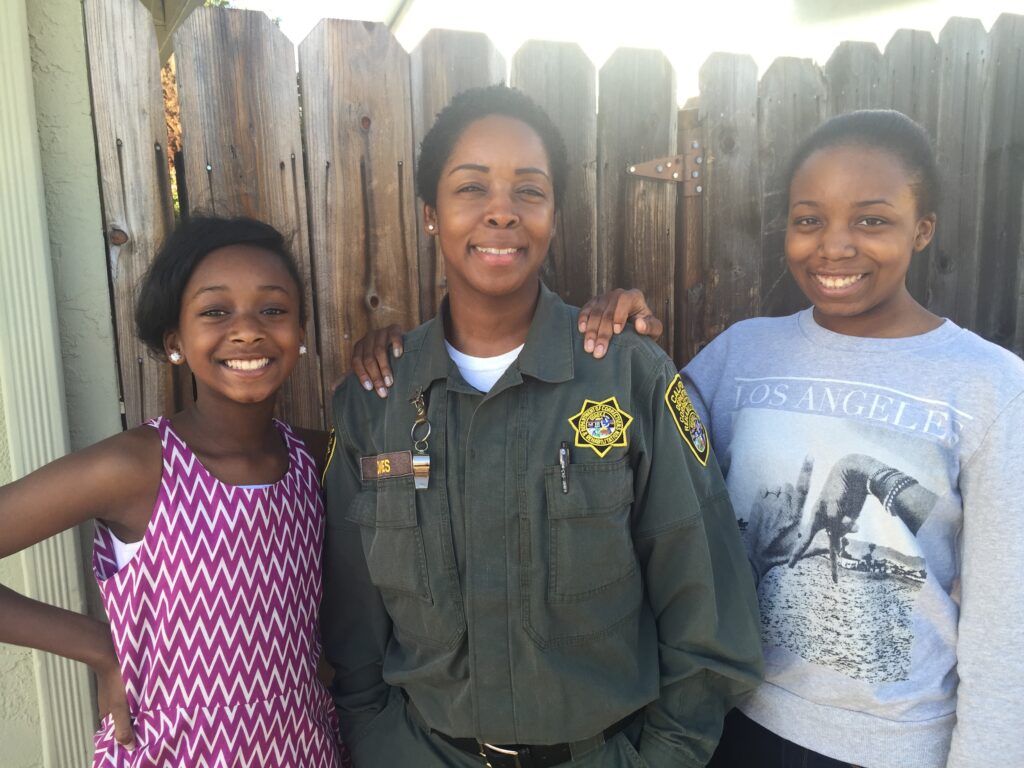Standing at 5’4’’ and weighing less than 130 pounds, it’s not rare for Guimmara’ (pronounced Gia-mar-a) Jones to get looks of doubt when she tells people she’s a correctional officer. But don’t let her small stature fool you: The 35-year-old—who barely looks a day over 21—has held her own in a male-dominated profession working with inmates twice, even triple her size for the past eight years.
“I learned early on that in order to gain respect amongst the inmates and my peers, I’ve had to remain consistent in my interactions with them,” Jones says. “If I started off mean or nice, I’d have to keep that up. The moment you change up, you become vulnerable and that is the one thing you don’t want to be in prison.”
It’s a career lesson that has applications to another part of her life: A single mother to daughters Sherenee and DiAjae Henderson (ages 17 and 11 respectively), Jones credits her job with providing a stable and structured home environment for her kids. But, she admits, “finding a balance between work and home life can be challenging. I often catch myself speaking to my girls like I’m their warden. They may not understand it now, but I’m preparing them to tackle this crazy world we live in the best way I know how.”
Jones gives mater mea a peek into her journey of becoming a confident correctional officer and mother.
Did you always know law enforcement was the career for you?
Yes, it’s always been a passion of mine. I feel people have the wrong impression of police or correctional officers—as if we are these figures that abuse their authority and don’t really protect or serve our communities. I felt I could make an impact on society and help change that impression by being [a] relatable [corrections officer].
I have had family and friends who were incarcerated, so it makes me less judgmental. I don’t feel everyone in prison is a horrible person—they just made some bad choices that landed them there. If inmates feel like they can relate to you, you can gain their respect and share knowledge about making better choices. My words could actually help rehabilitate the inmates so when they return [to their communities] they’ll be able to take some of that information with them and share it with others [so] they don’t make the same mistakes they did.
I made a point early on to prove that I can hold my own.
How did you get your start as a correctional officer?
I wanted to become a police officer, but my boyfriend at the time convinced me it wasn’t the right career for me, so I decided to pursue opportunities in the medical field. I was a unit coordinator in the intensive care nursery in a hospital. Once I became pregnant with my second child I knew it was time to change careers. I went out on maternity leave and never came back. It was the push I needed to start my career in the department of corrections.
I started at the prison in records; I figured if I was already an employee, I‘d be able to [network] with the right individuals. Once I became an officer, I used my knowledge from records to help me with completing paperwork on inmates. Most officers are good for being the muscle, but [struggle with] the paperwork side of the job. It’s given me a leg up.
How long did it take you to become an officer?
It took five years. I was promoted twice and became a supervisor of my department. Shortly [thereafter] I decided I needed to get started with applying for corrections. I applied for the officer’s academy and went through a series of psychological and physical tests. Once I passed those I was assigned a background investigator—that process took three years. Once I got the notice I was accepted to the academy, I couldn’t wait to get started. Being away from my kids and family for 16 weeks was one of the most challenging times of my life, but I knew the sacrifice would all be worth it once I became an officer. It moved pretty quickly after that—I graduated from the academy on Friday and reported to work on Monday.
Law enforcement is a male-dominated profession. How do you hold your own and gain respect as a woman at work?
The facility I work at houses 6,000 male inmates. There are 1,000 officers—300 of those are women—and a lot of the male officers don’t feel like women belong in this profession. Some view you as their little sister, so they try and step in and perform some of the more rigorous duties, such as escorting the inmates on death row or transporting the dangerous criminals to the hospital off-premises. But they also lose respect for you if you allow them to constantly step in and cover for you. It can be tricky. I made a point early on to prove that I can hold my own. We all graduated from the same academy and learned the same skills.
What does a typical day on the job look like for you?
I start my shift at six in the morning. Before I walk into work I go over scenarios in my head that could occur: an inmate could have a fight, a riot could break out, or I may have to pull out my baton to protect myself.
Once I’m in, I report to my unit in Administrative Segregation or Ad Seg—most know this as solitary confinement—where 240 inmates who are classified as gang dropouts and sexual predators are housed away from the rest of the inmate population.
A tier is a floor in the prison where 48 inmates’ cells are located. I head into my unit which is made up of five tiers. I check out my baton, pepper spray, cuffs, cuff keys, and an alarm which I would use if I needed to get the attention of my coworkers in an emergency. I am briefed about any significant occurrences from the shift before, which could be anything from an inmate being suicidal to a riot breaking out, or an extraction where we remove a prisoner from their cell for not cooperating.
Ad Seg inmates aren’t allowed to walk the prison freely and they are always handcuffed once they leave their cells. I act as their escort, taking them to the showers, doctor appointments, counselor visits, or to scheduled visiting hours where they can see their family and friends. I also escort them to their yard time. A day with no riots or extractions is the kind of day I enjoy the most.

How do you create a balance between your home and work life? Have you faced any challenges in doing so?
You tend to work long hours and see your coworkers more than your family. The prison is open 365 days a year, 24 hours a day. Oftentimes you are required to work overtime. Being a single mother I rely heavily on my fiancé, family, and friends to help out when I’m not available to be there for school or extracurricular activities.
I also do my best to leave work drama behind the gates. In the beginning I found it harder to separate the two as I wanted to vent, but there are things that your spouse or significant other won’t understand about this job, such as the constant feeling of having to look over your shoulder or making sure that everything around you is secure. Constantly being on guard is like a rush that you have to come down from. As soon as I walk out of work there is a weight lifted off of my shoulders. It’s like a silent stress. It’s hard to explain, but I’ve had other peers say the same thing. I use my commute home to calm down and kind of release the tension I may have built up from work. If I don’t feel I’ve been able to completely calm my mind, I’ll pull into the driveway at home and stay in the car longer or take a longer route home.
Constantly being on guard is like a rush that you have to come down from.
Has your career affected the way you parent?
At work my day is structured and repetitive, and that carries over to my home life. We have a pretty tight schedule that we follow every day. Once I pick them up from school, they do their homework while I make dinner. Next it’s shower time and then bed time, all to be repeated the next four days. The motto at work is “If you’re on time, you’re late, and if you’re early, you’re on time.” My kids have gotten tired of hearing me repeat the phrase to them, but they are usually punctual and I credit work for that.
They can’t get away with much either. I get paid to watch inmates’ every move so I’m very observant; I can tell when my girls are lying to me fairly easily—their facial expressions and body language always give them up. I instill the importance of safety and security in my girls. They both have pepper spray. It’s important for them to realize adults don’t always have a child’s best interest in mind, so they need to be cautious of strangers and sometimes even people they think they trust.
What’s next in your career?
I plan to get promoted to the role of lieutenant. I have already passed the exam to become a supervisor, and I’m currently on the list for any available positions. I would like to stay at my facility, but I also have to consider my kids. When you become a supervisor you lose all of your seniority as an officer. That means my schedule may fluctuate on a daily basis. With a senior in high school and a sixth grader, that just isn’t practical. Currently I’m on a set schedule and it allows me a bit more flexibility and stability for my kids. They, after all, are my first priority.
There is a high rate of turnover for correctional officers. Have you ever had doubts about your career choice?
I love what I do. I don’t ever recall being scared when coming to work. The [confidence] has to come from within, or you’ll be scared every day and it will show even if you’re doing your best to hide it.
Related Articles
How My Brother’s Jail Sentence Changed Me As A Mother
This Shonda Rhimes’ Quote On Power Is Exactly What You Need To Read Today















